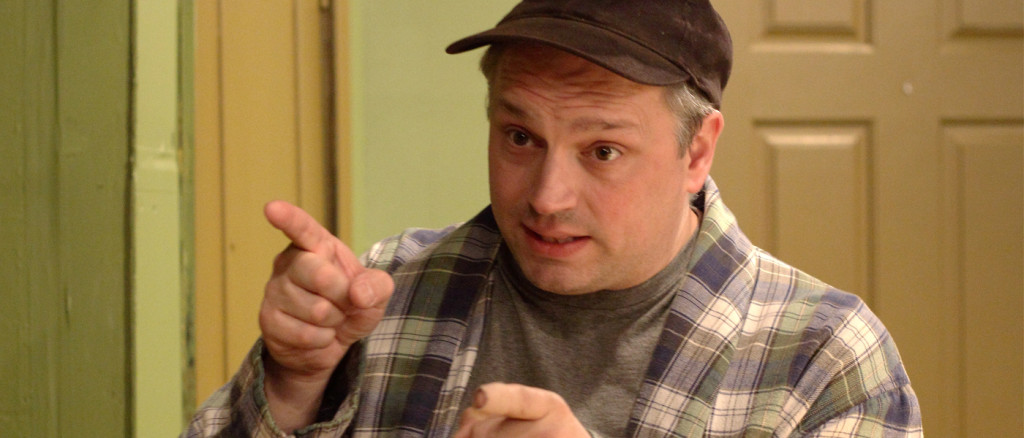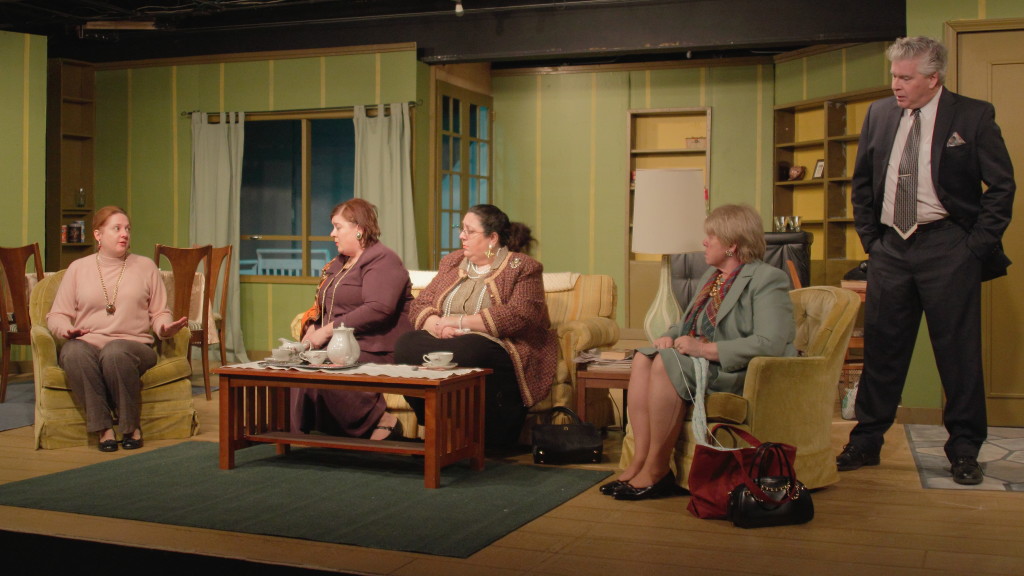Neil Simon’s rarely revived The Prisoner of Second Avenue is the darkest of all his comedies, bar none. So many misfortunes befall hapless adman Mel Edison that he feels like an anticipation of the Joe Benjamin character in the playwright’s God’s Favorite, Simon’s comic take on The Book of Job, written a few years later. Snip out the frequent laughter in Prisoner, running through March 1 at Appleseed Productions, and you’re left with a rough draft of Death of a Salesman set in midtown Manhattan. The secret is that the prisoner of the title does not rage against his fate or even bitch. What he does is kvetch, a Yiddish word implying complaint with a sense of absurdity in it all.
Prisoner is set at the time of its opening, 1971, when many New Yorkers felt they were trapped in a mini-apocalypse. Director Tina Lee reminds us of the date by running a track of All in the Family’s Archie and Edith Bunker warbling “Those Were the Days.” Mel (played by Robb Sharpe) observes, “This is the most crime-ridden city in the history of the world.” True, civility on the street had receded from those halcyon days at the end of World War II, a problem that has since been addressed by decades of well-planned policing.
At the time, though, the threat led to a kind of malaise that perceived everything as breaking down, from the economy to elevators. About the same time cartoonist Jules Feiffer wrote Little Murders, an even darker, less funny comedy that has not endured as well. A chief difference is that while Feiffer’s real subject is fear, Simon is actually focusing on family.
Mel begins in discomfort. He awakes in the middle of the night, yes, kvetching. While trying to sleep in his 14th-floor apartment at 88th Street and Second Avenue on the Upper East Side, he’s too hot. It’s July 23. When he gets out of bed, he’s too cold. The air conditioning is hyper-efficient. Next door two Lufthansa air hostesses are entertaining loud, libidinous gents from around the world. The harsh sounds of sirens and barking dogs float up the complete 14 floors to assault his ears. Everything in his milieu, including the cushions on his expensive couches, is an affront to his comfort.
We learn a bit later that Mel’s irritability is triggered in part by his having lost his job and not wanting to admit it to his wife Edna (Aileen Kenneson). Out on the street at age 47, but it’s not his fault, just a purge that wiped out the staff en masse. Not that Mel has anything to fear from Edna, who’s most reasonable and accommodating. Simon may have based Edna on his much-loved first wife Joan, then still in good health. By denying Edna comic lines, there’s no Punch-and-Judy butting of heads, which also means that Sharpe’s Mel has to engender most of the comedy on his own, which he does. Simon, instead, is saving Edna for bigger things.
What really drives Mel to the edge, and then off it, is staying home while Edna goes back to work to keep the household running. The paranoia pouring forth from talk radio, even before the advent of the right-wing blowhards, is more than Mel’s slender sanity can bear. He plunges into a nervous breakdown, at which time Edna calls in Mel’s family to see what can be done.
Much as Sharpe’s Mel, with Kenneson’s support as Edna, has been sparking laughter through all the grief, the comic highlight of The Prisoner of Second Avenue comes in the second act with the Edison family council, set two months after Mel’s collapse. Mel was the baby of the family and his siblings range up to the eldest, chronically scowling Pauline (Marcia Mele), and two go-along to get-along sisters, Jessie (Jenn DeCook) and Pearl (Pamela Kelley).
Completely unanticipated is another brother dragging his own emotional baggage. Tall, well-dressed Harry Edison (Jimmy Curtin) is clearly a business success, but his constant pacing as he speaks signals his deep discomfort. Another kvetcher, Harry lays his old hurts before the ensemble. In 31 years no one ever sang him “Happy Birthday,” and the sisters keep offering him coffee, forgetting that he hates the stuff.
Edna pleads the case for her loving husband. Mel’s a mess and pretty much unemployable, but he might pull through if he could break out on his own, like running a summer camp for children. If everyone chipped in, he could start with a down payment of: $25,000!
Although Prisoner is filled with experienced people and familiar faces, it still marks a departure for several. It’s a debut for director Tina Lee, long associated as a performer with Rarely Done Productions. She appears to have a confident relationship with lead Robb Sharpe, who delivers perhaps 66 percent of the lines. Together they keep a steady hand on the tone, which always threatens to slip into the grim or bathetic.
The role of Mel is a huge step forward for Sharpe, who has a long list of distinguished supporting roles, especially as the abused prisoner in The Exonerated (October 2011). The original on-stage Mel was the shortish, ethnic Peter Falk, and Sharpe’s interpretation hews closer to that version, refuting the tall, Harvard-educated Jack Lemmon’s incarnation in the 1975 movie. Sharpe’s successes can be measured in the laughs he gets from unfunny lines, like the flippant crack about the death of his psychiatrist, and that he can still get the audience on his side for the cockamamie plan at the end.
Jimmy Curtin’s Harry is so good he starts to steal the production from Sharpe. Aileen Kenneson’s Edna is the sanest, most generous character in the play. Marcia Mele has never been better as the ogreish Pauline, while Jenn DeCook and Pamela Kelley define differences in the sisters.
C.J. Young’s production design includes doors that slam on the tasteful set appropriate for Mel’s income. And Susan Basile’s costumes remind us that 88th and Second Avenue is a fashionable neighborhood.
For more like ‘Going Bananas in the Big Apple’ – CLICK HERE FOR STAGE



